The report from Jackson Mississippi wasn't pretty… But, learning what is really behind it and that it is happening all over the US was down right alarming! Our brilliant Dan Early put it all into perspective though, And blew away any slightest doubt that OriginClear is in the exact perfect position to benefit Water and achieve resounding success. Did we hear an 8-figure forecast for the booming pump station product line? Find out in the replay!
Transcript from recording
Opening
Dan Early: I can speak today about our first national account that we've just recently secured. Big major commercial account. They are investing in and want green technology, durable, sustainable, infrastructure solutions. After understanding the value proposition that is the EveraMOD™ product, that infrastructure solution that we created, they have adopted that as their preferred and their specified solution.
So that product line, just that one customer right there, I think will contributed at least another two and one half million dollars in top line revenue just to the pump station product line by the end of this year. It will probably go to 5 million next year just with that one customer.
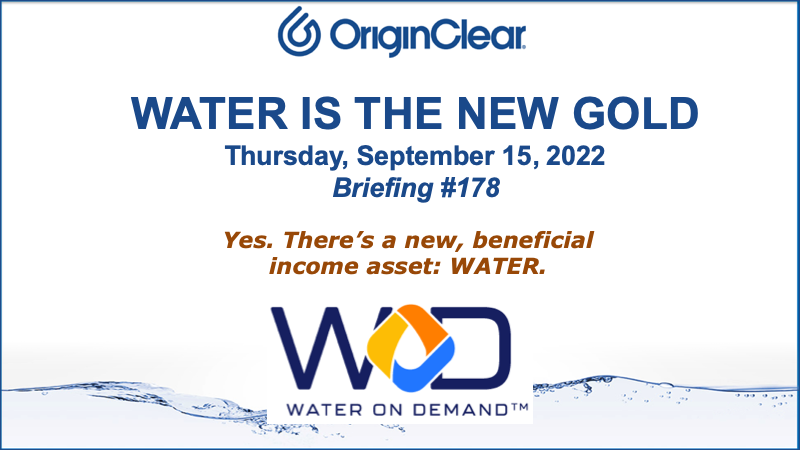
Introduction
Riggs Eckelberry
And hello, everyone. Welcome to the CEO briefing on the 15th of September. We got two more weeks in the quarter. I can tell you that I like the numbers as they're developing. We now have real time revenue recognition, I have completions now as we go. And so I'm able to know, thanks to the hard work of Prasad and David and Eric in finance as to how far along we are. And it's really wonderful. So I like I like where we're going.
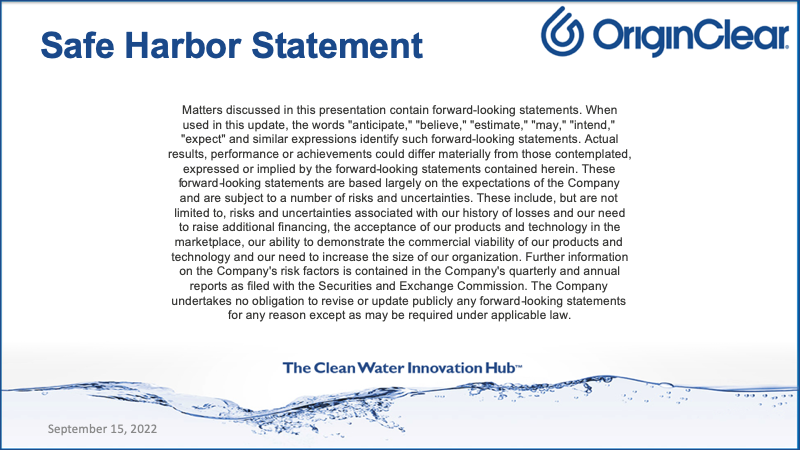
So without further ado, here's our Safe Harbor statement.
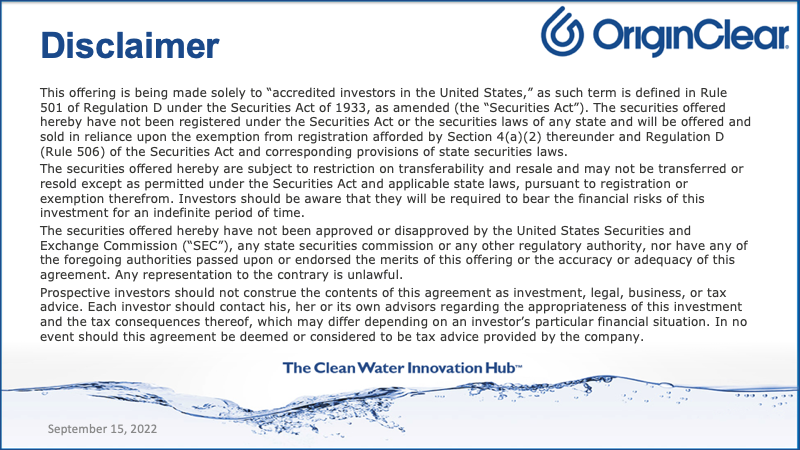
Here's our disclaimer.
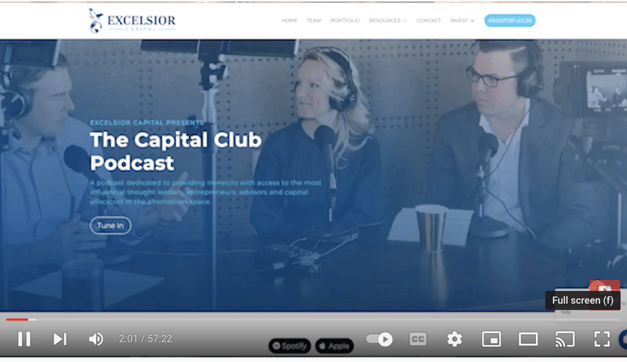
Robert Baxter tells me he's back. Thank you very much, Robert. All right. So I'm going to start with a very interesting recent podcast, which gets into some of the issues we've been talking about, and then we're going to get into the issues.
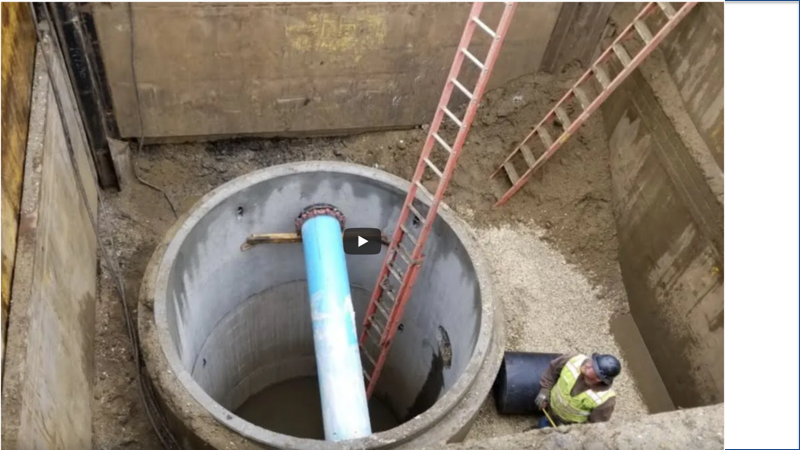
But if I'm talking about pump stations, which was that clip we opened with, this is what those concrete pump stations look like.
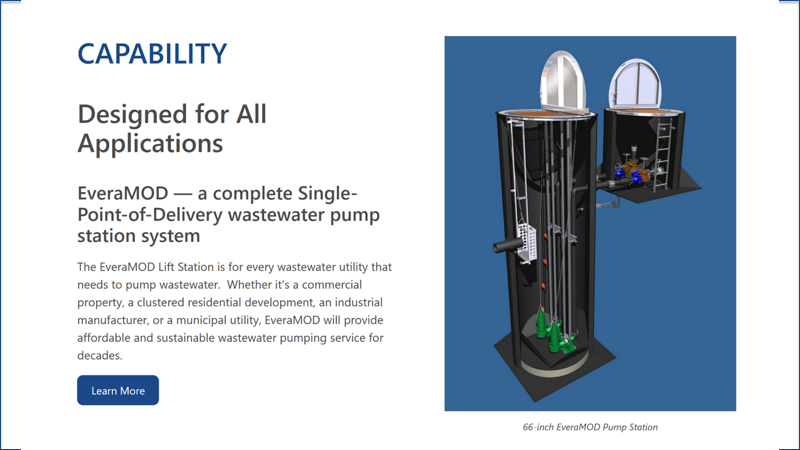
And this is what our cool high density polyethylene or polypropylene enclosures look like. And they have that up to 100 year life. And I'll be discussing that further. All right. Let's get started.
Start of video presentation
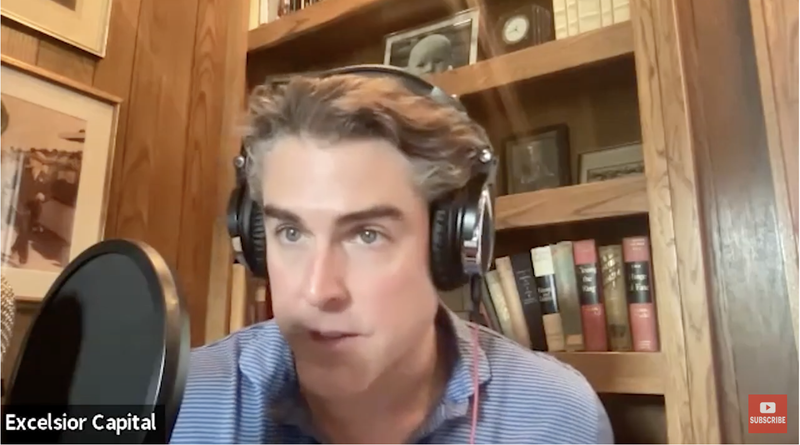
Brian: Hello and welcome back to the Capital Club podcast. Today I'm here with Riggs Eckelberry Riggs, thanks so much for joining us.
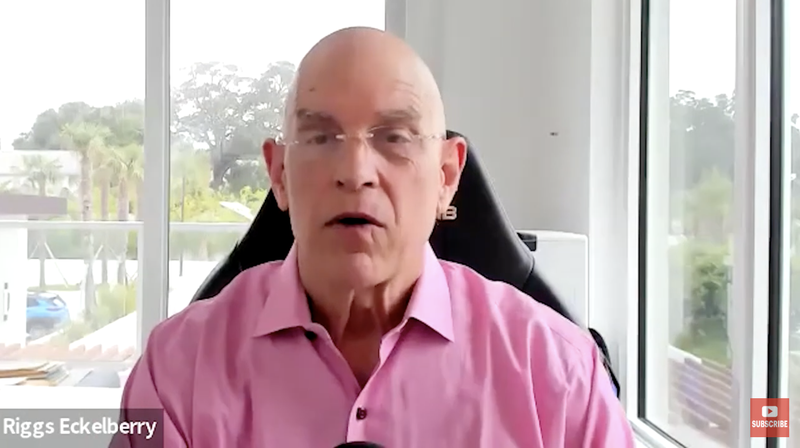
Riggs: It's a great pleasure, Brian. Thank you for having me.
Brian: Absolutely. And Riggs, we were recording this in early September 2022, and there is a town south of Nashville where I am called Jackson, Mississippi, which currently has no access to water. And it's been about a week now. And so this is a very timely conversation about the state of water infrastructure in America. And obviously it's becoming almost a geopolitical strategic issue in terms of access to water. So could you maybe give us just a high level snapshot of what the water industrial complex in America looks like today and how developed to it is?
Riggs: Well, yes, I have good friends in Jackson, a beautiful town, great people. And it's a sad situation that is occurring now. This there's many indications, we heard about Flint, Michigan, there's Fort Lauderdale, had sewers breaking Las Vegas, New Mexico is drinking out of bottled water right now as I speak. So it's happening all over the place. Unfortunately, what we have is we have a breakdown in central infrastructure for our 150,000 plus water systems in America. And for some reason, the funding isn't there. We had a $1.2 trillion infrastructure bill and they only allocated $55 Billion to water for the entire nation. And research has shown that we're falling behind by $75 Billion each year. So our infrastructure is falling apart and it doesn't seem it's going to get handled soon. And so our mission became, "What can we do about it?"
Brian: So, what is, what is the issue in terms of it falling apart? Is it a case of government just doing the job poorly? I'm trying to understand, are they, are they public private partnerships in terms of the industrial complex that manages the water infrastructure in America today? Is it state by state differentiation, depending on what jurisdiction you're in?
Riggs: It is a patchwork situation with sometimes very small municipalities. Look at what happened in Compton, California. They one day woke up to brown water coming out of their faucets and they said, what's going on? And the local water treatment company said, that was owned and operated by the city, said, "Oh, it's just magnesium, it want to hurt you." But, they were like, "Well, we don't like brown water." And they said, "Well, we've been asking for ten years for funding to fix it and it hasn't been fixed."
Well, that got taken over by the LA, Metro LA system and the problem got taken care of. But it's a symptom of what goes on here, which is that these are often very small operations and they're local funding. Federal funding dried up. It was quite high in the seventies and it just dwindled and it went from grants to loans. And I think it's just out of sight, out of mind. We take water for granted. We shouldn't. For some reason, I can't say our roads are great either, but at least we're aware that roads and bridges need to be taken care of.
And so I just think that we have a broken process for centralized infrastructure. Give you an example. Let's look at look at the bulletproof train [bullet train] in California. What bulletproof train? It's not happening. What's going to happen instead is we'll have the Google self-driving car. Why? Because there's freeways already. So we have a problem with infrastructure at every level. We're just not building those big projects anymore.
And even if we wanted to, I'm in a region, Pinellas County, Florida, which is quite urbanized. Where would they put them? Right. And so the problem is, where do you put the sewage systems? There's a NIMBY problem, not in my backyard. The funding is not there. So we saw a trend emerge that was documented in wonderful research by Group Lux Research that in 2016 really convinced me this was the way to go, which is decentralization.
Take the load off the center and make the the polluters, the users do their treatment at the edge. Now, this has a double barrel benefit. Number one, the users at the edge, now businesses, get better control over their water treatment. They can recycle, which means they get, America doesn't recycle its water at all, that's a separate issue.
And secondly, it enables the municipality to not have to deal with all that industrial and agricultural water, which is 80, 85% plus of all water use. And now they can focus on humans who are being overcharged right now. I don't know if you've been hearing about the social justice issues around water rates. People are spending 12, 14% of their take home pay on water. Come on, this is ridiculous.
Ireland makes water free and it should be free. But we can't do it if the cities are trying to treat all this industrial toxic waste, all this agricultural waste, let's offload that and let the cities do their job for the people.
Brian: Right. And that's the trend that I wanted to hear your commentary on is 50s, 60s, 70s became part of this kind of public infrastructure project in America. It's clearly broken, right? We're seeing what's playing out in real time in the southwest where Lake Mead is empty. Partially due to what's happening with the climate, but also just poor management and poor policy across the board. You feel like privatization and the three hallmarks that you kind of called out there, direct, local, decentralized. That's the solution to this problem, in your opinion?
Riggs: Well, I don't believe that we should privatize the central systems. This has been a disaster in England. In 1998, they sold all of the reservoirs to private organizations, and now they are in a terrible drought. There's no reservoir capacity. And so and this happened in Flint, too, where a local operator didn't do the right stuff. So I believe that central water systems should remain in the public hand.
If a city wants to delegate the operating of a system to Veolia, that's fine, that's great. But they should retain control. What we're talking about is businesses doing their own water treatment, taking responsibility. So all they're sending to the city is treated water, right? Now, that doesn't create a problem for the city at all. That's actually a benefit.
It's kind of like mainframes and PCs. I'm old enough to remember having had to schedule time on a mainframe because why we were serving the mainframe. Pcs flip it around. Pc serves me. Sure. 90% of the time it's not working. It's just sitting there idle. But it's ready for me on the spot.
So that's the benefit of taking things to the margin, is lots of availability, lots of service. Businesses like, I mean, we deal with them constantly, our businesses increasingly, we almost tripled our our revenues year to year as we recently announced, and most of these are decentralized, treat your own water companies and they like it. Because they get control and also they save money on water rates. There's all kinds of reasons why it's good and it's beneficial for the public policy.
So, I believe it's an unstoppable trend. It's, the water industry likes it. The cities are like, "Great, I don't have to treat your water. That's great." So everybody is in favor of it. We found that there was one barrier and this is a barrier we actually found. We were, COVID caused us all to look at our business model and we're sitting there March 2020 going, "Oh Lord, what's going on?"
And we realized this. We had, I don't know, $45 million worth of deals sitting there waiting to happen in various stages. And we finally realized, "It's the money, stupid." If we turn it from a capital expense to an operating expense, just make it water as a service, then people sign a service contract, and they get their water treatment. And businesses are accustomed to paying on the meter anyway. And that became a program that is really a flagship program for us, which is called Water on Demand™, and it's combined with decentralization, but it accelerates it.
Brian: So you mentioned the utility costs. Obviously, inflation is playing a part in this. I know that there is research out there or notes saying that a large swath of America Americans are now 90 days late paying their utility bills. In some jurisdictions, this issue is not going to go away. You mentioned some names. What is the scale of the private, for lack of a better term, I'm not sure, but water market today. And what is that, what do those corporations look like? What are the services they're providing and how are they creating innovation within what has been typically a reserve of the public institutional world?
Riggs: Well, yes, there are some very big players. The largest American one is American Water Works, very good company. Give you an idea of the scale, their mergers and acquisitions budget alone yearly is $1,000,000,000 just to buy companies. Right. Very large. Now, what are they doing? They are they are tapping the municipal bond market, which is how these central systems are generally funded. And they're servicing the cities and they're doing a fine job. They are not really focusing on decentralization.
That is something that is, I don't know if you ever heard of Clayton Christensen, a great thinker, The Innovator's Dilemma, a wonderful book he read wrote, which says that the seed of the new things, they're always suppressed by the existing players because the revenue model is different. Right? When we go decentralized, we go smaller. And for Veolia, a 500,000 water system is like too small right? They want to do ten, 20, $30 million systems and there's a place for that.
So we have two scale issues. We have the quote unquote, mainframes, and they're going to continue. But at the same time, we have the quote unquote PCs. And those are a growing market. And numerically, it's much, much larger because of the number of businesses in America. And it's an unstoppable trend.
There's a great case study by a another company in our space called Cambrian Innovation, great company, and they were approached by Russian River Brewery in Sonoma County. And Russian Brewery was being was encountering major rate hikes by Sonoma, also very, lots of regulatory demands and so forth. And they said, "We gotta take, we got to like..." Business people think of risk reduction. They don't want to they don't want to be in the water business. They just want the problem to be contained, like water is fine.
So Cambrian helped them out with one of these water service deals and Russian River signed a contract and started paying on performance on throughput contracts, they're called. And it worked out great because they were able to get the contract had built in, its long term ten, 15 years, it's got indexed inflation and so forth. But at least you're you know what it's going to be and you know how we don't know what's going on with inflation right now. It's impossible to tell.
And here's the weird thing, Brian. Water rates are skyrocketing. Even before 2020, they were running 65% higher than regular inflation already. What is up? What is up with that? Why are we skyrocketing water rates? And so businesses are like, "Whoa, whoa, this has got to stop." And they put it in a box and they go, "Okay, I've got a contract. It's a decade long contract. I can worry about something else." And that I think is very rational and it's going to it's going to increase the quality of water in America because cities will not be having to deal with the most toxic water, which is industrial.
Brian: So there are some big players in the space. You referred to them as Big Water. They're they're changing things, but they're they're attacking the biggest whales first, which makes sense. But as a private concern, as a private investor, I mean, is there a way to take control of this issue yourselves? If you were, you know, a landlord, an owner, a private citizen? I mean, what options are there in the marketplace for you today?
Riggs: Okay. Well, there's two sides of it. One is, how do I treat my water and how do I deal with that? Now, there's, generally the water utilities have not abandoned the general user. You can still flush your toilet, it goes fine. So that's not the issue.
What's happening more and more is that, for example, housing communities, housing developments are being located off grid and they're setting up their own independent system. Why? Because it's economically much better. They get cheaper land and they don't have to deal with the capital expense of running sewage to the city, etc.. So there's a lot going on in that area.
But, really the other side is investment. Right now, I don't know about you, but I have no idea where to put my money. I look at the stock market. I'm like, it's up. It's down, it's sideways, whatever, right? And even gold, bitcoin, nothing's working. Energy is in trouble. Even though the energy companies are making money hand over fist, the stocks aren't doing great.
Here's why. All of these commodities and risk assets and so forth are, have been running for a long time, they're maxed out. And what we're saying is, "OK, we've created a way for the ordinary investor to invest directly in water projects." These new decentralised ones and it turns water into an asset. Obviously I'm pitching here, but it turns water into an asset that generates royalties for you, the investor, and you get shares in this Water on Demand. So it's a it's a new investing avenue.
And we find that people are like, "Oh, wow, I can invest in water. How cool is that?" So people want to do something about it and they can. They can invest in Water on Demand and they will, I believe, get good return on their money. But they'll also be helping this big mega-trend of self sufficient water treatment by agriculture and industry.
Brian: So is a fair corollary to this energy where, you know, for instance, America is one of the few places where you can actually own the mineral rights beneath the surface of the land. Private individuals can then contract with larger groups to make a yield on those working interests in terms of mineral rights. Is it a similar parallel here where you're taking the government out of the equation, you're privatising this asset, this commodity, and you can make income off of it?
Riggs: Right now, we're, to be clear, we're not talking about water rights, which is a whole separate game.
Brian: Right.
Riggs: And there's actually good stuff happening there where farmers, there's a new, the Chicago Mercantile Exchange has got a has got, you can trade your water rights. You can reuse them. That's all good stuff. I have a good friend who has a company called Water Ledger that enables farmers to resell their unused water rights. All this stuff is good.
What we're really talking about is once people have the water in their hands, what do they do with it? Well, they should do two things. They should treat it and they should recycle it. I mentioned earlier that the US is very bad with recycling. Contrast that with Israel, which recycles almost 90% of their water. The number two in the world is Spain with 20%. Us is at 1%.
Why? Because we built our water infrastructure very similar to the energy grid, which is one direction outward. Our energy grid does not have a two way conversation and neither does a water grid. And it's not going to change. We're not going to start sending stuff back uphill.
The solution then is to get more turns out of the water right where you're using it. And I believe that's an important part of the water scarcity conversation. So let business users do their own thing. It's beneficial to them. It's beneficial to the overall environment. It results in better utilization, better social justice. The municipalities can concentrate on the more needy users because they're not trying to serve corporations. It's all around a really, really good remedy.
Brian: Yeah, it's interesting what you're talking about in terms of similar to the electric grid, where some jurisdictions, if there's excess generation, it can be sold on the secondary market to other jurisdictions or utilities that need that. That doesn't exist in the water infrastructure space today in America?
Riggs: It's starting to happen. As I said, my friend Rave´ Mehta, Water Ledger, he's got that going. There's that Velas market index is is another way they're trading it. It's really in its infancy and that's a separate trend from what I believe is, what's a bigger trend in energy is people generating their own energy where they are and feeding energy back into the grid.
Well, that's very similar to what's happening with decentralized water. It's a very similar thing. So big trend towards auto-treatment. And by the way it's, people more and more are interested, we've discovered a trend which is evident, which is people are interested in continuity. Where's my power going to be? food? water? People have become a little bit paranoid about what's going on.
And there's been this big move away from the mega cities to the secondary cities, which, by the way, is, I think, healthy. We need to have better distribution of populations, more manageable. But it does over stress. For example, Florida is the beneficiary of a lot of immigration, but it also is, again, over-stretching the systems. So, as they move, they're interested in their own continuity of essential services, rightly so. So doing their own water is great.
Now, there's another thing that's going on, which is people are increasingly aware of what's called forever chemicals. And later today, I'm going to be interviewed on on a network about this. This is becoming a big topic. People are realizing these forever chemicals. Basically the stuff that's that was in Teflon, it's been largely obsolete, but the stuff ended up going into the groundwater and now it doesn't get out of the system. It's kind of stuck in there.
And so people need to filter their water. And most people, again, you have a rich man, poor man problem. Because, I've got water filtration in my home but other people have to live off tap water and it is what it is. So, I think that there's going to be a need to do something about the incoming water.
We do not operate at the single family home level. We're just not in that mass market. But for example, we have a premium hotel chain that commissioned us to do whole hotel water, incoming water treatment because they wanted to get ahead of the problem. They wanted to tell their clients, their guests, "The broccoli was made with chemical free water and your shower does not have forever chemicals."
And so that's going to become a major trend where housing developments, hotels, RV campgrounds, you name it, travel stops, all that stuff are going to want have incoming water handled. And also they're going to want to be off the grid for treating that water. And then thirdly, they're going to want to recycle the water for irrigation and so forth. That is a big coming thing and I think it's super exciting. I love the idea that people can take control of their water finally.
Brian: Well, Riggs, I want to thank you for coming on the show is really fun and a super interesting industry and asset class that I don't know anything about. So, it spurred me to learn more. Thanks again. I look forward to staying in touch.
Riggs: Happily. Let's have a come back in six, eight months when we have got more to report. And Brian has been such a pleasure. Thank you.
End of video presentation
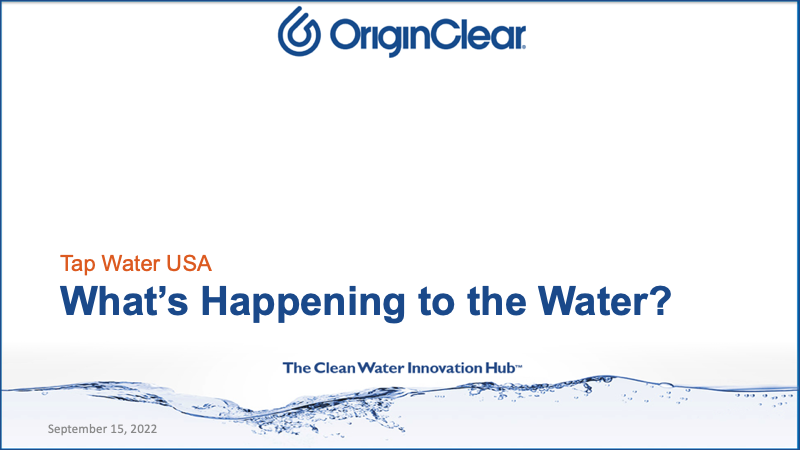
Riggs: That was super cool. What's happening to the water? That was the story that I had discussed earlier.
Start of video presentation
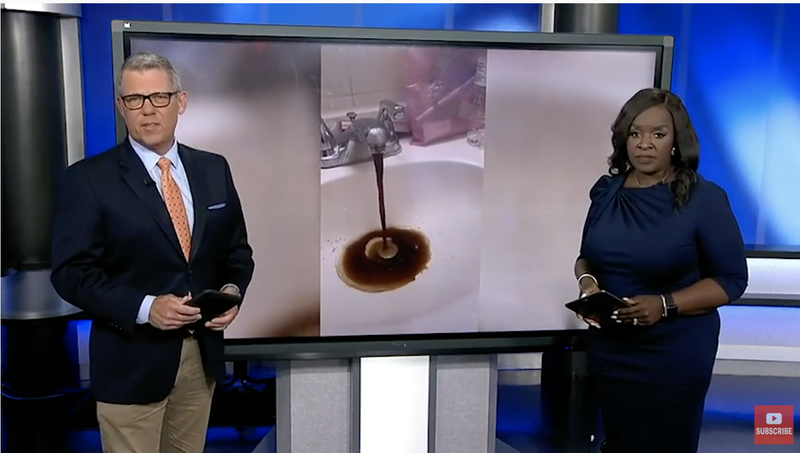
FOX Newscaster 1: Take a moment and look at this. That's supposed to be water, but it looks more like coffee or even mud.
FOX Newscaster 2: This isn't new. This has been going on in central Mississippi for, what, two months now? Now, this video was shared on Twitter thousands of times. It shows just how bad, how horrible the ongoing water crisis is in Mississippi's capital. And as I said, this isn't new. This has been going on for several weeks now.
FOX Newscaster 1: We also know that today that the EPA's Office of Inspector General says that it will investigate the city's water. This is a crisis. It really is a crisis. This includes looking at administration of clean water and drinking water that's basically revolving around funds. We actually sent Fox13, Mississippi reporter Tom Dees to Jackson today as he found out the city has restored water pressure, but the water is still contaminated.
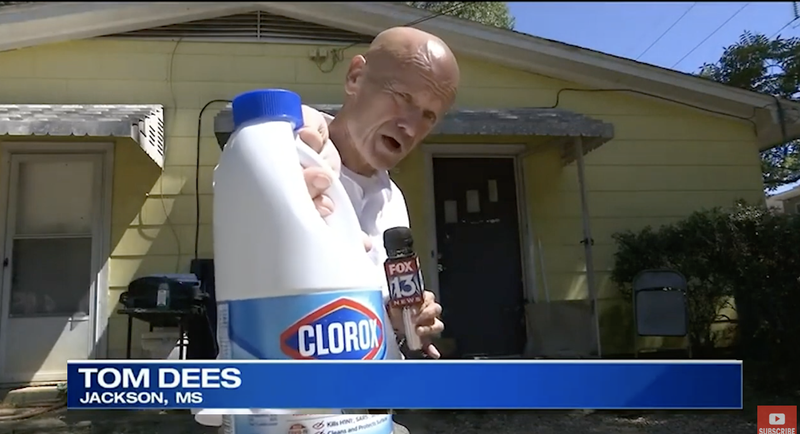
Tom Dees: I spoke to a woman by the name of Patricia Anderson here in Jackson, Mississippi. She tells me she boils the tap water and puts bleach in it just to wash her dishes.
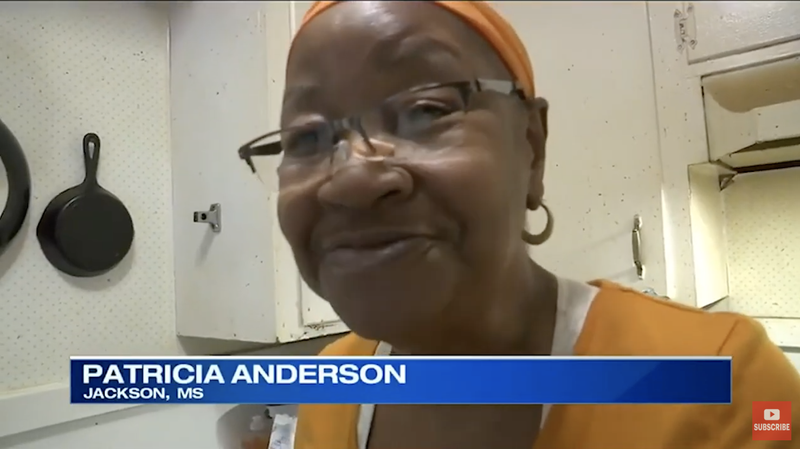
Patricia: Boil the water and put bleach in it. Old time remedy. Bleach'll kill any germ. You got to bleach it.
Tom Dees: Anderson cooks for her family here. She says washing the dishes can be a hassle, but she's keeping them done as she can. She showed me what the water coming out of her faucet looks like.
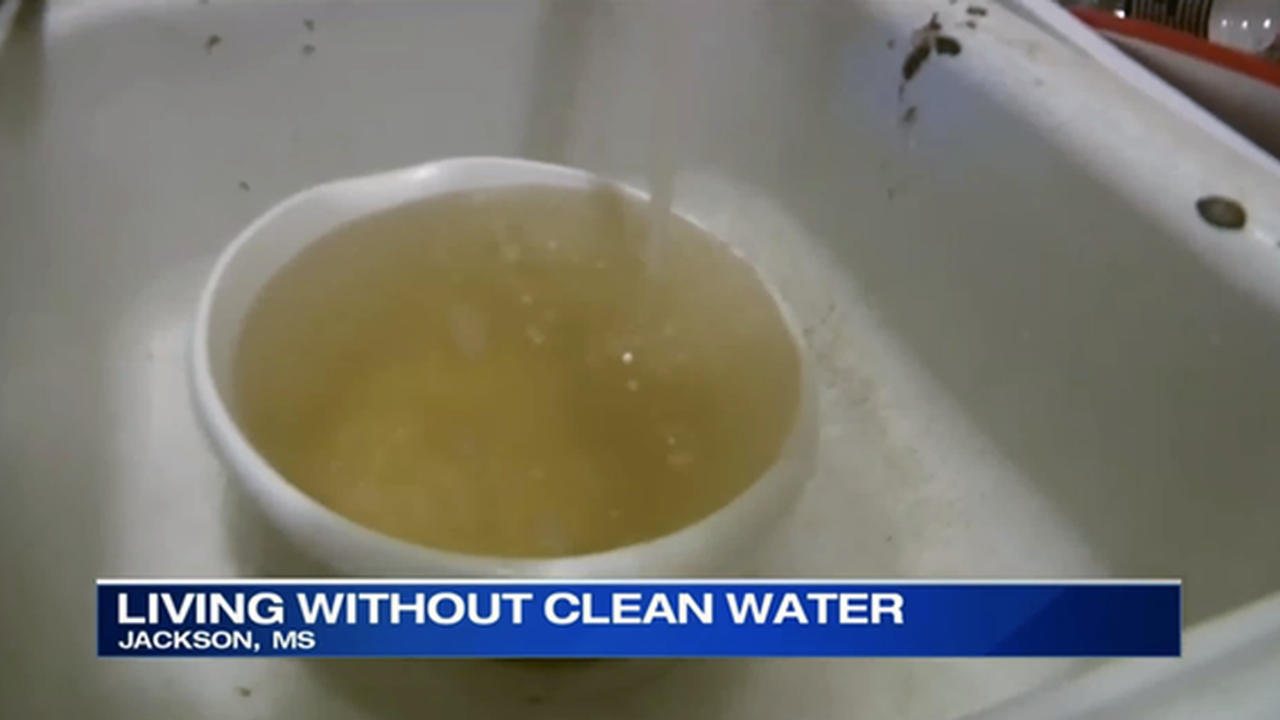
Patricia: They gave us some water. You just get that... You see it changing?
Tom Dees: Yeah, you can see the color changing.
Patricia: That's the cold water.
Tom Dees: Anderson tells me she goes to get water at places around the city, but she worries about people around town who can't get out and get it. She tells me she won't even give the water out of the tap to her dog.
Patricia: No, the dog drink potable water. In the jug we're drinking bottled water, think you got some potable water. No, the dog don't drink that.
Tom Dees: In Jackson, Mississippi. Tom Deese, Fox 13 News.
End of video presentation
NPR Report
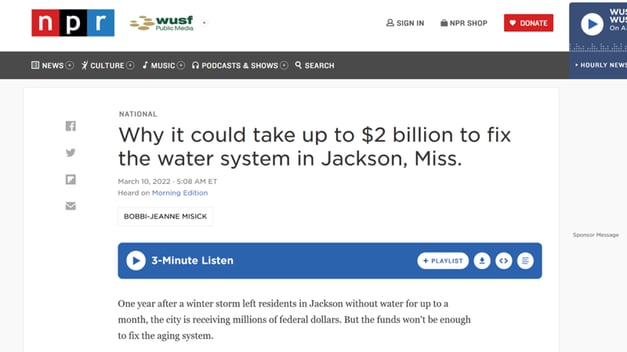
Riggs: This is that story at NPR that says it's going to take up to $2 Billion to fix the water system. Basically, they got a double whammy from winter storm and this overwhelmed the system. But as I said in the podcast, the money being allocated is far short of what it should be.
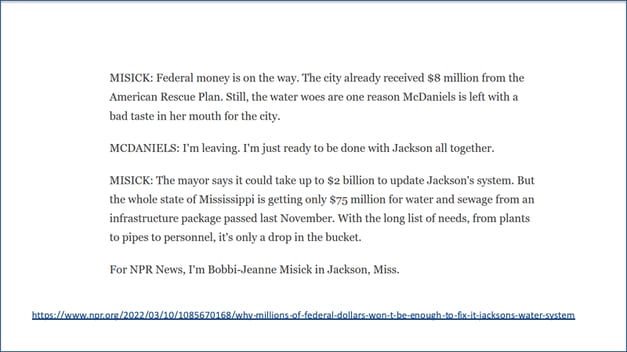
Here it is right here. City received $8 million, but the whole state of Mississippi is getting only setting $75 million for water and sewage. And, you know, we're talking $2 Billion for Jackson's system alone. That's crazy, right? That's super crazy. All right. Just to say that it's not just Jackson or Flint.
Start of video presentation
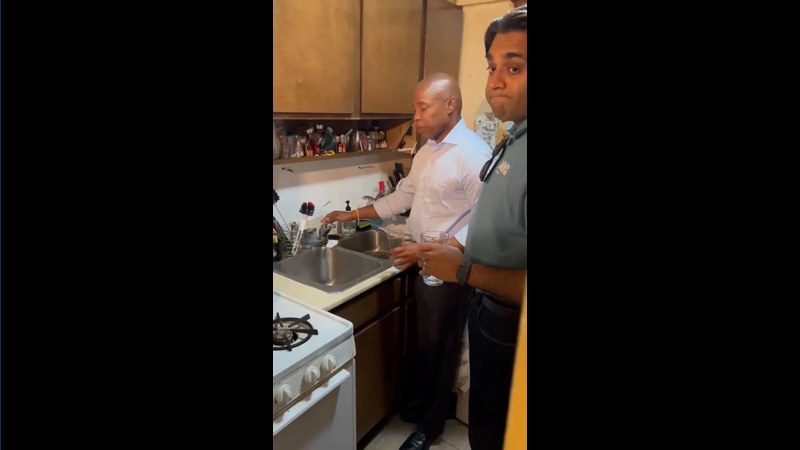
NYC Mayor: Nothing is better than New York City water.
Reporter: Mayor, where are you at?
NYC Mayor: Here at Riis houses and, you know, really wanted to show with our Department of Health and Mental Hygiene Commissioner, Dr. Vasan and the rest of the team as we tell the Riis House's residents that it is okay to drink the water. And I want to thank all the city agencies that came together to supply temporary water during the mean time. And we're just here to make sure that people know. I'm drinking it. You know, the water is safe to drink.
End of video presentation
What to do About it
Riggs: So before I move on here, I also promised to cover what's happening with the pump station business. So that's going to be ongoing. But I just wanted to mention that the mayor is necessary to reassure people because there is a crisis of confidence. And that is the real problem that we're seeing. The problem here is obviously continuing and what to do about it. I covered in that podcast. It's very simple.
We have got to unburden the central system because essential systems are not getting fixed. Who is going to allocate $2 Billion to Jackson, Mississippi? I told you that I reached out to a state level legislator and even he went, "You know what? I got nothing to do with the city." It's like the city's got to handle everything, but the city doesn't have the resources.
Now, should we help the city? Well, I would love to, but it needs serious cash. I don't have $2 billion. Not right now. So what do we do instead? Let's go ahead and implement Water on Demand, which is an easy way for industry to do its own treatment. It's beneficial, they get, they win doing it. They get to recycle, all these good things.
And that's 89% of the load taken off of the cities. And now the remaining 11% can really be taken care of and the water rates can go down. Ireland does it for free. Maybe we can do it for free in America if we're not servicing all of the industry and agriculture users, which are most of the usage. So that's kind of my sermon for the day. Let's go ahead and listen to Dan Early and see what's going on with the pump stations.
Dan Early video presentation
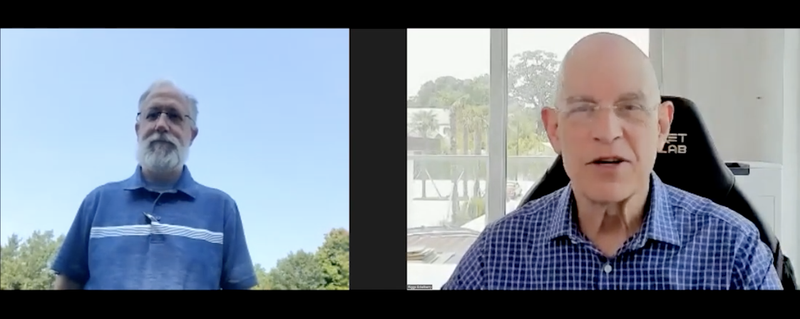
Intro
Riggs: Mr. Dan Early. How were you, sir?
Dan Early: I'm doing well, Riggs. Good afternoon. Good to see you.
Riggs: Likewise. You're looking very sunny there in Virginia.
Dan Early: It is an absolute wonderful late summer afternoon here. It's about about 75 degrees. Not a cloud in the sky. Just beautiful weather.
Riggs: Yeah, well, you know, I could see why you wouldn't want to leave that place.
Dan Early: It's a, it's a well-kept secret. Don't spread the word. It's a beautiful place to live, weather is beautiful, climate is great, scenery is gorgeous. It is very spectacular.
Expansion News
Riggs: That's so true. Well, Dan, first of all, congratulations on some of the recent months of production. It's been amazing. You're part of the the success story where we announced our Q2 year over year gross revenue was 240% up and gross profits were 288% of year over year. And you're a huge piece of that, so I greatly appreciate it. On top of it, you had the month of May was equal to more than the entirety of 2021. So that was another announcement we made.
About Pump and Lift Stations
So what what is interesting about this is that looking at the business you're doing, a lot of it is in pump stations or lift stations, right? And again, I know they're somewhat interchangeable. Some people like to say pump stations or portable water, lift stations for sewage water. But that's kind of a convention, I'm sure that it's used interchangeably. Pump stations, lift stations, what do they do and how are they important in a sewage network?
Dan Early: Okay. I'll be, I'll be glad to answer that, Riggs. So in layman's terms, a sewage or wastewater lift station or pump station is designed to collect wastewater at a central location. It can be from houses, from offices. It can be in a neighborhood, and it collects it at a, at a low point. And it typically will pump it or lift the wastewater to a much higher location. So it can then be discharged further downstream to another collection system or to a wastewater treatment facility. So that's generally what it is, is the pump from a low spot to a high spot.
Riggs: And now there's, they're also used in the the potable water distribution network, right?
Dan Early: They are. In the potable, in the potable water side they are more commonly referred to as booster stations. Typically, we're transferring water, boosting pressure, transferring water from one pressure zone to another, pumping up from a treatment plant to a finished water atmospheric storage tank, where you'll then do pressurized distribution to the neighborhood for drinking water purposes.
Riggs: Reminds me of my time in New York City, where there's a forest of water tanks above all the buildings. Right?
Dan Early: That's exactly. If you look at the old black and white photos and movies from back in the thirties and forties, you see there's water, there's wooden water, tanks on top of the building. Those were the drinking water supplies for all of those. There's taller buildings and high rises.
Riggs: Sure. Sure. Okay. So, so what you're really saying is that when we say pump stations in your business, you're talking about transporting sewage, wastewater.
Dan Early: Correct. That is what we do. Yep.
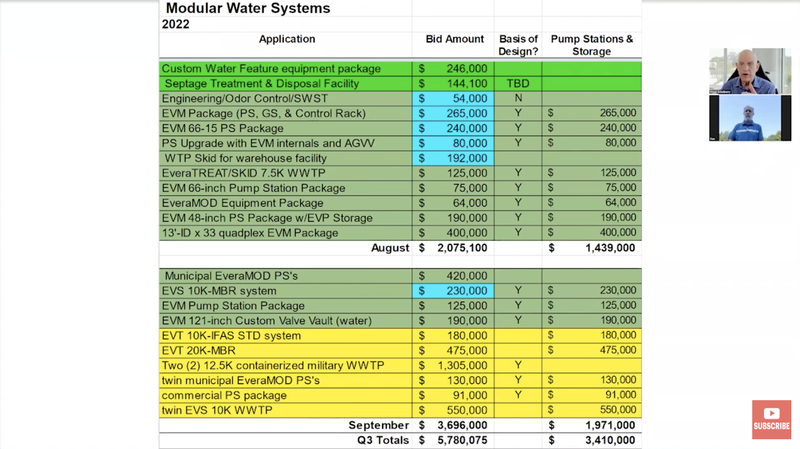
60-70% Pump Stations
Riggs: All right. And, let's take a look quickly at the last couple of months. August and September, without getting into what's been closed or whatever or who the client is. But just to take a look here, we have the application. And over on the right hand side, we have which of these are pump stations.
And that we can see right away that, for example, in August, $1.4 million out of 2 million, that's bid. We're not saying, did it get closed or whatever. We're not going to get into that in this call. And in September, almost 2 million against almost 4 million. So it really dominates in August. It's a little bit less dominant in September, but you're running about 60, 70% pump stations right now.
Dan Early: We are. And that is the ratio and the breakdown that you see here in the charts that are on the screen. That is a function of the targeted and focused, focused marketing effort we've had to promote the EveraMOD™ pump station product into the wastewater infrastructure marketplace. We're working directly with our independent sales reps, working with strategic partners in the form of consulting engineering firms. So all of this, this backlog of work that you see and the successes that we've had in contract closings, those are all a function of our targeted focus to this, to this particular industry.
Riggs: Okay. And what, how are you marketing? Well, first of all, what's your unique selling proposition? And then how your marketing?
EveraMOD's Value Proposition
Dan Early: So the selling proposition that is unique to the EveraMOD system is a couple of things. As you as you recall from previous meetings and previous briefings, the EveraMOD system is a value add and it is a, is an infrastructure solution specifically geared towards the wastewater infrastructure conveyance world.
And the value is derived from the fact that we use heavy plastic manufacturing. We have these corrosion resistant wastewater, wet wells and valve vaults that overcome the limitations of epoxy coated steel and reinforced concrete that are highly susceptible to corrosion in these very harsh wastewater environments. So, that's a value proposition, number one.
Value proposition number two is that we have developed an engineer and standardized product, the EveraMOD system. If you go to our website or if you've attended any of the webinars and any of the educational series presentations that we give, you'll understand that the EveraMOD is not a, is no longer a custom engineered solution. We have very much standardized the approach to how you evaluate and conceptually design and finalize the final configuration for the EveraMOD system. So that's the second. That's the second value proposition.
The third value proposition is the the ability to do a turnkey single point of delivery for all of that. It's the structures, it's the pumps, it's the control system, it's the ancillary equipment. It is all of those things. So we've taken it very clunky, very segregated, a divorced delivery model that's been the norm over the last 50 years. And we've consolidated it and streamlined it both in the engineering and in the manufacturing perspectives. And that's where that's where the true value is. Lower initial first cost, it has 4X times the longest lifecycle cost as far as its ability to be durable and sustainable.
Riggs: Okay. So cost lifecycle, the standardization that you've got. And the design so that and then finally the fully integrated or turnkey solution.
Dan Early: Correct. Correct.
The State of Pump Stations in America
Riggs: What is the state of pump stations in America in general that you're running into the condition of these pump stations?
Dan Early: They, the, the wastewater lift station, wastewater pump station marketplace for existing facilities, existing utilities that own and operate these types of infrastructure solutions. They are, these pump stations are everywhere. They, they number in the hundreds of thousands, if not millions, on a quantity basis. A lot of these systems are now 30, 40, 50, even 60 years old. Most of them are at the end or have significantly exceeded their expected service life.
And now they are they represent contingent, they are current and future contingent liabilities on the part of the utility owner and operator. And so that, that, because of the corrosion issues and because of the very harsh operational environments and the materials of construction that were used 30, 40, 50 years ago and even still being used commonly today.
All of those things combined to create a very dire, in my opinion, from my professional opinion, a very dire future for wastewater utility systems, especially when it comes to pumped conveyance. So that's, that's the, it's, it's an, we are in a bad spot here in North America. As great as the country is, our rankings for civil infrastructure is pretty low. And it's a function of this, the nature of these utility systems.
Contingent Liability
Riggs: Yeah. I mean, just to say, like in the U.K., for example, they are replacing pipe at the rate of 0.5% per year. Yeah. It's like 2000 years. They'll they'll make their way around. This is completely out of whack because, you know, they're suffering the case of that pipe. Of course they're suffering a lot of net revenue losses because of the leakage. But in the case of the wastewater, if that's going into the aquifer, then it creates a potential liability for the, for the operator, right?
Dan Early: Correct. The the environmental, the contingent liability, the current and future contingent liability that I mentioned. It is, it purely is a function of the potential for environmental damage, environmental contamination. Leaking collection systems, leaking wet wells, leaking forced mains, all of this wastewater that is being collected is now leaking back into the groundwater, making its way into the water streams and surface waters. Nitrogen pollution, fecal coliform, pollution, all of those things are very, very detrimental to the environment. So it's a huge liability.
Riggs: Wow. That's amazing. And just to correct myself, I said 2000 years to the UK, it's actually 200 years. I think, that math, I've got to watch that math. But anyway.
Dan Early: I didn't check it on the calculator, so I took your word for it.
Riggs: Yeah. Half a percent. Wait a minute. That's 200. Not 100. Not 2000. But nonetheless, just to make it clear for our audience. But coming back to the issue here, so contingent liabilities is really something that ultimately can create a litigation, right? That's what the danger is.
Dan Early: Yeah. A lot of public utilities that own and operate collection systems and conveyance systems that have dilapidated equipment, equipment pump stations that should have been replaced ten or 15 years ago, that are, that are contributing pollution or they're discharging pollution and untreated wastewater to the environment. When you have local environmental groups that are aware of that and even the customer base themselves, when they are aware of this and they seek legal action to take legal action against the utility provider, it's just a colossal headache. It's just a, it's bad. Nobody wins. Nobody wins.
70/30 in Favor of Municipalities
Riggs: Well, okay, so the, our regular product lines, Modular Water Systems™, even a lot of Progressive Water Treatment is for the actual business, the decentralized user versus municipality. But in the case of the pump stations and lift stations, that is, you have a big mix of municipals, right?
Dan Early: We do. We do. It's, I would say right now it's, as far as the breakdown, it's at least I would say it's probably 60/40, maybe even 70/30 in favor of municipalities, the municipal customer base and the specifying engineers that work with these municipal public works departments and these, these public utility entities, they are really rallied around the EveraMOD product line.
4X the Service Life
The, the total value proposition, the engineering that was gone into it, the manufacturing model, the single point of delivery and ultimately the sustainability of the system relative to the structures we use, the heavy plastic structures, all of those things are, check the boxes that these engineers are looking for that the end users are looking for relative to having a sustainable wastewater pumping station infrastructure solution.
Just to give you an example, Riggs, a conventional concrete based structure which has a precast concrete manhole. It might have a 20, 25 year expected lifecycle, structural lifecycle, whereas the structural plastic, heavy plastic structural manhole we use with the EveraMOD system has a 100 year lifecycle. So you have a 4x increase in continuous duty service life. That is a huge value to the end user.
That means that they don't have to worry about these frequent replacements, the budgeting, the cost of maintenance that goes with these things, the interruption of service, all of those things. We're able to check all of those boxes and make sure that those things do not become contingent future concerns on the part of the end user.
Riggs: Yeah. I mean, another thing is that I believe you're able to do retrofits. Am I right?
Replacing the Concrete Model
Dan Early: We can. The EveraMOD system and the way the structural plastic cylinders and the structures are assembled, we can go into an existing wet well, especially the much larger concrete wet wells and we can actually retrofit the EveraMOD station into that, into a wet well like that. It does work better on the larger ones just because of economy of scale and just the amount of work that's involved in trying to take a larger lift station out of service and then to upgrade it with an insert system that we would provide.
Smaller systems, what we are seeing, I'll share this with you Riggs, we do have quite a few public sector jobs in the pipeline, where our smaller, the baby brother versions of the EveraMOD, we're actually doing full on direct replacement. They may have a wastewater pump station and concrete station here. We will move over maybe 20 feet and we will install a new pump station and do a change around a yard piping change around and bring the new station on line and it resumes, it assumes service and then they take the old equipment offline and and take it out and decommission that.
Riggs: Yeah, I see how that for a certain point, it's just not worth rehabbing the pump station. I get that.
Dan Early: Correct.
How Competitive is EveraMOD?
Riggs: Now also I was hearing that, first of all, I think we're price competitive, right? Even with the epoxy coated steel and the concrete.
Dan Early: That, right there, I am really tickled with this. Since the, since COVID has impacted the globe and we have seen inflation take off here in the last 12 months. Supply chain supply chain disruptions, all of those have actually worked to our advantage. And, and by that what I mean is that because of our efficient manufacturing model, our single point of assembly and single point of delivery, both in contract and in delivery of the equipment, we are very, very efficient.
And the resin, the plastic resins used to create the structural wet wells and the valve vaults, while we have experienced inflationary pressures and we have seen resin prices go up and we've seen plastic material prices go up, it's been incremental to the overall cost of our pump station. In the last 6 to 12 months I have seen our station, where we may have been neck and neck price wise with a conventional concrete station, we're now a much better value.
Because, the inflationary pressures and the price, pricing escalation on transportation, on concrete, on all the various trades used to build a custom field erected station, all of those things have skyrocketed the price of a conventional pump station delivery. Ours is much, much more constrained and much more controlled. And it's a huge, it's a huge first capital cost benefit to the end user.
Rapid Adoption
Riggs: Wow. So less expensive, more, more readily available, there's no lag times, better product. And so, I mean, it begs the next question, which is, how's, how your, your, how are your victories going? How are you getting... Conquests? How are your conquests going? I think you've, getting some national accounts, that kind of thing.
Dan Early: We did. We are seeing that. We're seeing, we're seeing very rapid adoption at the municipal level. And I'm very pleased to say that just with a handful of reps that we work with and them just working part time with that particular product line, the pipeline of opportunities, the, where we are basis of design for those systems, that continues to increase month over month. I'm very pleased with that.
Eight Figure Forecast
I'm also very pleased with our ability now where we are landing, we are starting to land national accounts with very large national companies, mostly in retail, in the retail space or in the private sector where they are adopting the EveraMOD because it checks all of the right boxes, single point of delivery, fully integrated design, fully engineered solution. One check, they write one, they have one purchase order and they receive all of the equipment.
So we have really solved a lot of problems for these for these entities that work on a national account basis where they may need to buy three, four, five pump stations a month. I expect that next year, as we continue to add additional national accounts to go with the ones that we currently have now, the EveraMOD product line, it'll easily be a, I would project that in 12 to 18 months, we could be bumping up against an eight figure top line revenue for an annual revenue line. So I'm very pleased, very pleased with where we're going.
Riggs: That's huge.
Dan Early: It's getting that close. We are, the forecasts are showing that, again, no no guarantees, but everything is all going in the right direction. The foundation, the legwork, the education that we're doing and the proof, the reality of the product. Now that we're getting product into the field and people see this, there's not a, it's not a, this ephemeral concept of an idea. It's real. And we're showing it to people now. So that's, that's what's making it very exciting.
Riggs: Wow. Well, I think that covers the landscape. We're going to, there's some good stuff on the Water on Demand design. I'm not going to cover this interview. I think it's kind of piling on too much. But I know that you are working very hard to create Water on Demand specific products. This does not include the pump stations. The pump stations is a world of its own that's really not appropriate to the design, build, own, operate model. Right.
EveraMOD and Water on Demand
Dan Early: The EveraMOD, the EveraMOD would be a single component to a Water on Demand delivery model. It could be a part. It's typically it doesn't fit the true mold of Water on Demand the way we envision it, the way we're working together to create that. But it would be a it would be a complement to it as a sub component.
Riggs: Well, I love how EveraMOD is coming together. As you know, we are looking at we are currently separating out as its own business unit, give it dedicated staff, really pile on and I think it's going to really return a lot of, return on investment going to be amazing and I love the work you're doing, so Dan please don't let me stop you.
Dan Early: Well, I got to get back to work. I appreciate it. I'm glad to do it. It's a lot of fun Riggs. I really do appreciate the opportunity and I like what I do that.
Riggs: Fantastic Dan. Thank you so much and enjoy your September. Okay?
Dan Early: We'll do. Good talking to you.
Water Quality in New York
Riggs: That was cool, by the way. I've been corrected, a bunch of people. That was Eric Adams, mayor of New York City, which makes the point even worse, because when I was living in New York City in the eighties, New York water was incredible. It was truly incredible. The fact that he's got to go out there and say it's good.
It blows my mind because we knew that we had the best water through this vast Delaware water system that came down from upstate New York built by the Italian Masons back at the turn of the century, the 19th century. And it's just an amazing system. And it does get messed up because we have to pull from the Hudson River. But I thought it was ironic that Eric Adams had to do damage control on that.
Audience Questions & Participation
I'm going to respond to some of the questions. So Emanuel Kearney wants to know, "Who is on the ground monitoring these systems? Is it origin service?" OriginClear. We always say OriginClear and never say Origin because that's the, that's the rocket company, "Servicing and maintaining the various commercial systems in a given municipality, the municipality or these businesses themselves?" Right.
These systems are completely maintained under Water on Demand. It is financed, so you don't have to pay any money upfront, you just pay as you go, and it is maintained, fully. So the city does not have to. This is a really, really on point question because it actually unburdens the city from all that load because the business under, under contract gets all these operation, operation and maintenance, O&M taken care of and that's part of it.
Now, why would the city do that? It's because they get benefits. Number one, they get a guaranteed price, which, water rates have been skyrocketing. This puts it into control. Number two, they can reuse the water, which gets more bang for their buck. Right. And number three, they're not subject to as much of the comes and goes of the city. They are basically off the grid, which is kind of cool.
Benefit for the city, and by the way, the cities love this program they're totally, I've not heard anybody disagree with this. They're totally on board with it because again, it takes a load away. They are very happy and they're going to be able to service the 11%. Let's see. All right. So that's that.
The other thing. "What are we doing today for Jackson, Mississippi?" Okay. I'm going to, I'm going to review what we're doing for Jackson, Mississippi. We can't help the city of Jackson, Mississippi. It needs $2 billion. What we are doing is we're going to businesses and saying, hey, we'll pull you away from these cities.
Now, the other point I want to make. I've tried now for 14 years to help people in trouble. You come along. I'll help you. That. No, no, no. It's impossible to start relationships in the middle of an emergency. It doesn't happen like you have. You have to work way in advance. So unfortunately, we don't have the Band-Aid.
The Solution
But this is the solution. I'm going to pierce through. I'm going to get my good friend who in the state assembly, and I'm going to work him over because this is not going to go away. It's not going to remain a city problem. Jackson is also the capital of the state. So this, this representative is in Jackson. That's where I met him. And you can't just ignore it, right? This is a big deal. So I am going to continue lobbying.
But as far as we go, our job is to open up water treatment to America's investors. We call it Water like an Oil Well™. You get a productive asset and the businesses get taken off the grid. That's the solution. And I also wanted to correct another thing, since it's my day for correcting things.
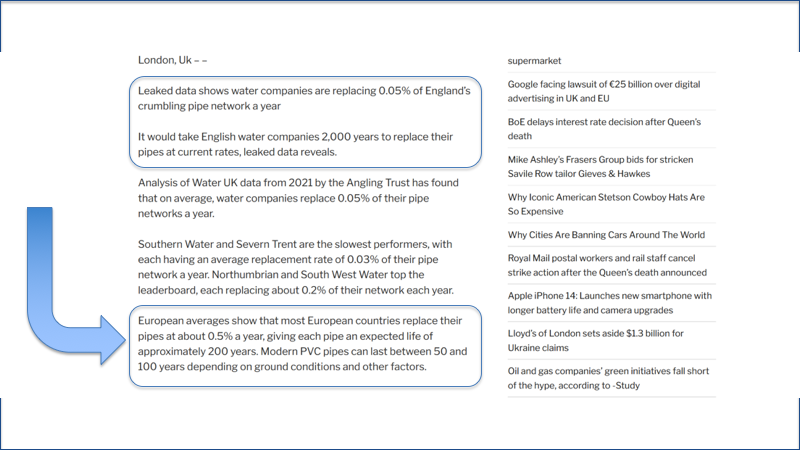
I mentioned about English water firms. And England is replacing 0.05% of England's pumping/pipe network. And whereas the European countries do it about half a percent a year, which is still not enough, because even the heavy plastic pipes that we know about are 50 to 100 years. And that's not enough. Obviously, 200 is more than that.
And Ken points out. "Absolutely, agriculture is an ideal target for our Water on Demand solution." I'm going to ask the amazing Ken to join me as we've come up on the end of the hour. And I've covered a lot, but I think it was interesting. I like the guy at the beginning. He really was...
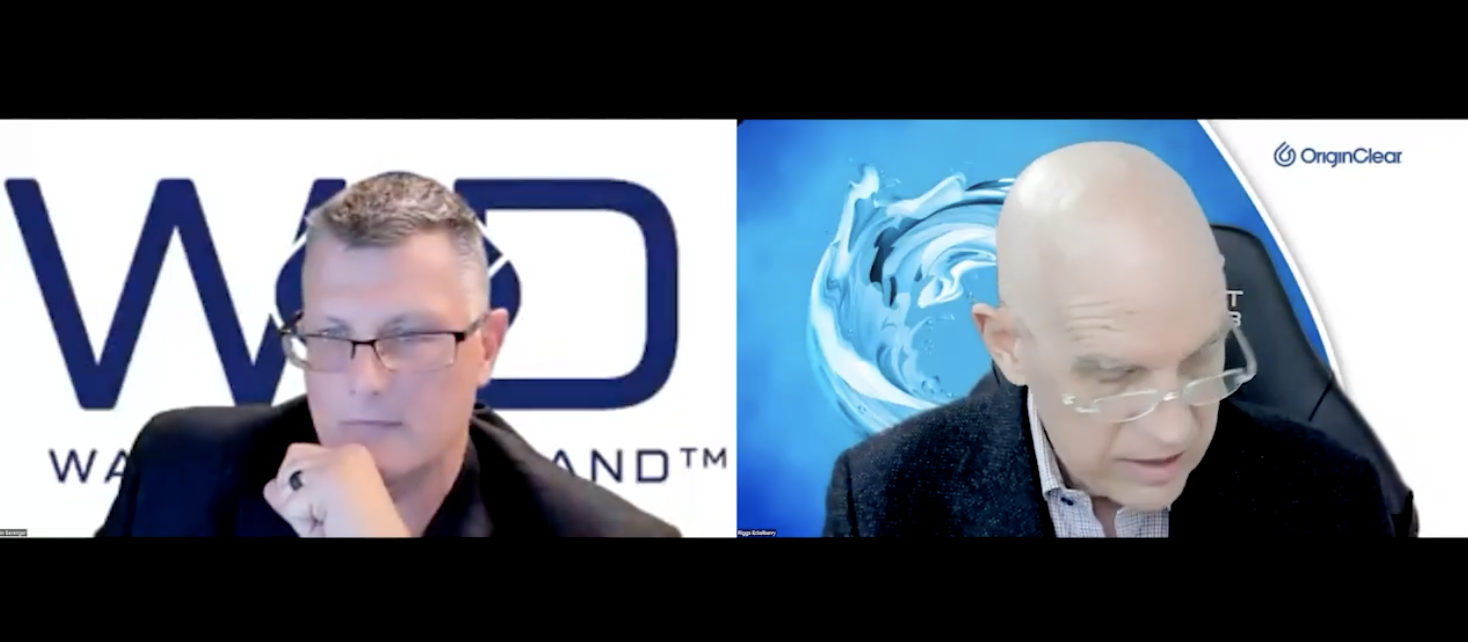
Freewheeling Discussion
Ken: And thank you for saving me for having to continue to type. I commented that I love his questions. He had a very kind of capital markets perspective on on how this operates and his questions were kind of ahead of the game. They really were. I was very impressed by that. And it's funny, he said when he mentioned energy, you and I just had a conversation earlier today where Water Like an Oil Well when he said is this, is kind of like energy. It kind of went off. It kind of got off on a distraction there.
But the way I describe this to people who really don't fully, you know, again, they flush the toilet and everything works, right. They don't fully comprehend how this is a, how this is a, pay stream model that can provide half a century of income, is this is like tapping a well, in this case instead of oil, water and the fee to turn that toxic waste back into clean, at least downstream water that could be discharged is a service that can run for decades and decades and decades.
So Water Like an Oil Well, it really is the best way of describing it. And I was just, when he said it, I almost said it out loud, "Water like an Oil Well." So I love that interview. I hope you do him again. I think what's happening with us over the next six months will really change that, that interview in my view.
Early Adopter Phase
Riggs: Yes. And Emanuel Kearney, this is the last question I'm going to I'm going to take. And he asks, "What criteria eliminates a business versus criteria that qualifies a business for Water on Demand?" Actually, everybody, because they don't have to be too great on credit because we keep ownership of the asset. It's a Rent-A-Center model.
So you, as long as you're willing to do it and you're basically in business, not a thief or whatever. I mean it's a very basic requirement. But you don't, you're not, you're not hammering your credit. You're not having to do a personal guarantee or anything like that. So what qualifies a business to Water on Demand is willingness, because here's what we got right now is we're at the early adopter phase of this.
Who is it who is in Jackson? I think Nissan is in Jackson. Why can't I go to Nissan and do it? Because Nissan is not an early adopter. They're like, well, we're fine. So we have to go at this phase of the rollout of Water on Demand with the enthusiasts, the people who are like, "Wow, this is super cool."
And I will have a report on this. We're working very closely with Ivan Anz, the brilliant founder of PhilanthroInvestors, who took Equity and Help to the INC 500. And he now is working on making that happen for communities. Equity and Help was built to get people into homes that they otherwise could never afford. Now he's doing it for a whole housing developments, and Water on Demand will be integrated. He is a true enthusiast and he's going to help propel it. I'll be covering that more.
Thank You
James Wright. "Greetings, everyone. Hope everyone's doing well." We're doing great. I'm going to wrap it up because I really promised to keep these just under an hour and that's what I'm going to do. Thank you, everyone. So next week, we will be covering how to really get this Water on Demand cranking.
There's going to be some product information, but I really liked hearing Dan Early with this pump stations that, it's a prosaic product, but we are killing it with pump stations and there's millions of pump stations in America. So with that fine capitalist thought, I'm going to leave you. Thank you, Ken. And thank you, everyone. It's a pleasure. Catch you next week. It's going to be more more exciting stuff.
Ken: Goodnight,
Riggs: Goodnight everyone.
Register for the next Insider Briefing: HERE
%20250px.png?width=250&height=53&name=OriginClear%20Logo%202019%20(RGB)%20250px.png)




